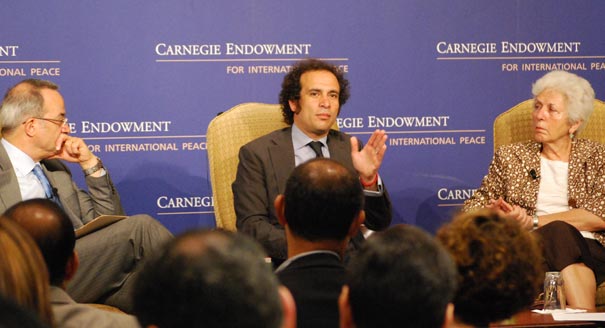Registration
Thank you!
You will receive an email confirming your registration.
Amr Hamzawy, one of Egypt’s best known liberal members of parliament and one of the founding members of the Carnegie Middle East program in Washington and Beirut, returned to Carnegie for a discussion with Marwan Muasher and Marina Ottaway on the current transition in Egypt.
The Situation in Egypt
Hamzawy emphasized four points to assess the current transition. He expressed optimism that Egypt would progress in the right direction, although a few difficult years remain ahead.
- Delayed Timetable: Hamzawy noted Egypt is behind in terms of its timetable regarding the handover of power from the SCAF to elected civilian bodies. While the SCAF had originally promised a transfer of power within six months, this did not take place. Furthermore, the parliament is the only elected body and faces serious legitimacy issues.
- Human Rights Violations: Egypt has been the site of numerous human rights violations. There is an absence of security for citizens and protesters; civilians are tortured and military trials continue. Hamzawy noted the number of civilians referred to military trial since February 11, 2011 has been greater than the number under Mubarak’s 30-year rule.
- Political Discourse: Egypt is currently witnessing a dynamic political discourse, said Hamzawy. Citizens are following debates closely and are well-informed on the country’s developments.
- Changing Political Sphere: While an imbalance between the power of Islamists and non-Islamists remains, the political sphere is constantly changing and non-Islamists are becoming more relevant and can now be regarded as an empowered minority, he said.
Internal Developments
- Non-Islamists: Ottaway stated there was an initial inability by non-Islamists to build consensus and a strong constituency in Egypt. She suggested that incapacity to mobilize is a deep problem that can continue to affect parties’ popularity. Hamzawy agreed that while non-Islamists were initially unsuccessful in building popular support, this is now changing. He presented El-Baradei’s Constitution Party as an example of an umbrella organization that will bring non-Islamist parties together and will allow smaller parties to merge.
- Islamist Popularity: Hamzawy believes we have witnessed the peak of Islamist popularity in light of their election to parliament and inability to address the needs of the Egyptian people. He also added that it is overly simplistic to say that the Brotherhood has moderated while in power, but it is true that the group is mature in its balance of pragmatism and ideology. He noted that while the Salafi Nour Party is conservative on many social issues, it has been cooperative in liberal initiatives like the NGO draft law.
- Al-Azhar’s Role: Hamzawy stated that secular and liberal parties have adopted the language of the al-Azhar documents on democracy and personal freedoms, and he himself included such wording in his platform. He added that Dr. Ahmed Al-Tayeb of al-Azhar was instrumental in helping to freeze the unrepresentative Constituent Assembly and that al-Azhar as an institution has been playing a very positive role in Egypt’s transition.
- Women in Parliament: Hamzawy voiced his discontent with the poor representation of women in parliament. Women’s issues are likely to be debated heavily in September and October in light of proposed legislation on divorce, custody, and the minimum marriage age, he added.
- Coptic Participation: While a growing number of Copts are leaving the country, Hamzawy observed that a growing number are also becoming more involved in politics. He stated his dissatisfaction with the poor Coptic representation in parliament, but was hopeful as long as they continue to remain civically involved in the country’s developments.
- NGOs and Unions: An NGO draft law regarding registration—making it more convenient for Egyptian organizations and expediting the process for international organizations—has been finalized, minimizing the ability of the minister of social affairs to block the growth of such organizations, said Hamzawy. He added that a mandate allowing for free association among unions is also being developed.
- The Economy: Hamzawy said that thus far, the three pieces of legislation passed with regards to the economy have been highly populist and have not realistically taken the country’s budget and capabilities into account.
Regional Issues
- Egypt and Tunisia: Ottaway said that while Tunisia has been receiving positive press, if you look deeply, it is facing many difficulties similar to Egypt. For instance, tensions exist among Ennahda members and between Islamists and non-Islamists. Hamzawy agreed, adding that Egypt has more human rights violations and is missing a solid timetable, which Tunisia had early on.
- Foreign Relations: The Guidance Bureau of the Muslim Brotherhood seems to be incorrectly replacing the presidential palace as the official address of Egypt for foreign visits and meetings, said Hamzawy. The inaccurate overemphasis placed on the Brotherhood by foreign powers like the United States may lead to the marginalization of other important political actors in the Egyptian scene, he added.
- Relations with Israel: The natural gas agreement with Israel has come to an end, but the priority of the Egyptian people is to keep the relationship with Israel as is and to sustain the peace treaty, said Hamzawy. He added that there is no interest in moving beyond this minimalist approach as long as Israel continues to build settlements in the West Bank.
- Regional African Relations: Hamzawy stated that Egypt wants to move beyond the negative legacy that was left behind by the previous regime with its African neighbors and the Nile Basin countries. He said that a Friendship Association was being established between Egypt’s parliament and a number of African nations’ parliaments.
